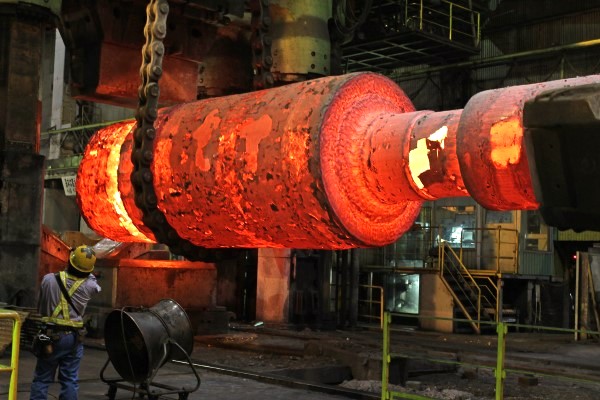Given that “maintaining and strengthening supply chains” was stated as one of the pillars in the proposed “Grand Design for Future Nuclear Policy and Guidelines for Action Toward Realization,” presented by METI’s Agency for Natural Resources and Energy (ANRE) at the end of December 2022, METI also announced the establishment of the Nuclear Supply Chain Platform (NSCP), a framework to support nuclear-related companies in Japan.
In his opening address, METI Minister NISHIMURA Yasutoshi said, “When it comes to resolving global issues, there has never been more interest in nuclear power than there is now,” emphasizing the significance of the symposium. He praised Japan’s nuclear industry for the “excellent accumulation of technology and human resources over the past 50 years.”
Referring to his meeting with Secretary Jennifer M. Granholm of the U.S. Department of Energy (DOE) in January 2023, in which they discussed nuclear supply chains in their two countries, the minister said that maintaining and strengthening supply chains was an urgent issue “from an economic security perspective as well.” He indicated his intention to proactively support activities through the new NSCP framework.
In the first of three video messages from overseas, Dr. Fatih Birol, executive director of the International Energy Agency (IEA), expressed concern about the current global energy crisis. Noting that many countries have implemented policy recommendations put forth by the IEA last summer advocating nuclear power, he said, “The world is coming back to nuclear power.”
Also via video, Director General Rafael Mariano Grossi of the International Atomic Energy Agency (IAEA) told participants that according to the IAEA’s high-case projections released last fall, “new nuclear development of 600GW is expected in the next 30 years.” He said that he expected a significant role to be played by suppliers with specific expertise, including in instrumentation and gearing. At the same time, he said that he was worried because “industries throughout the world are facing supply issues” at the same time. He called on all nations to engage in “borderless discussions” toward maintaining supply chains. He then expressed high hopes for Japan, with what he called its “high-level of manufacturing technologies and R&D infrastructure.”
Finally, Director General Sama Bilbao y León of the World Nuclear Association (WNA), in her video message, noted the need for so-called “sector coupling”—namely, the establishment of open, transparent business environments, improvements to business foreseeability, and technical development toward other uses than power generation, such as heat utilization.
On the state of development of advanced reactors in Japan, representatives of Mitsubishi Heavy Industries (MHI) and Hitachi-GE Nuclear Energy talked, respectively, about the prospects for the advanced light water reactor (ALWR) “SRZ-1200” and the small reactor “BWRX-300,” the latter a joint effort of Hitachi-GE and GE of the United States.
Representatives of JGC Holdings Corporation and IHI Corporation (IHI) talked about investments in development of small modular reactors (SMRs) by NuScale Power, a U.S.-based developer of SMR technology.
In discussions, JAIF representatives introduced business exchange activities with overseas counterparties, and efforts to connect business between JAIF member companies and companies overseas.
From the point of view of domestic suppliers, people from TVE Co., Ltd. (valves for nuclear applications), and the Nippon Gear Co., Ltd. (valve actuators) talked about quality assurance, measures for responding to supply disruptions (including shifting production to other companies and transferring manufacturing technology), and issues and efforts involving continuation of techniques.
ANRE Director-General OZAWA Noriaki for Energy and Regional Policy noted that there had been 14,000 nuclear engineers and technicians in Japan prior to the giant earthquake of March 11, 2011, but only 10,000 today. As the backdrop for creation of the NSCP, he described the severe state and absence of “foreseeability” in the nuclear market, specifically, circumstances in which supply chains may collapse unless strengthened now. The government, he said, would support the continuation of human resource development and business participation in overseas projects through the NSCP.
KATO Akihiko, executive vice president of Mitsubishi Heavy Industries (MHI) and head of its Nuclear Energy Systems division, said there was no time to wait for measures in support of infrastructure. “If the building of new nuclear power plants (NPPs) were decided today,” he said, “there would not be meaningful work for suppliers for seven years.”
In closing, JAIF President ARAI Shiro expressed keen expectations for projects under consideration in many countries to build new NPPs. “Through their participation in projects overseas,” he said, “Japanese companies will maintain and strengthen their technological capabilities, and contribute to improving the safety of nuclear power plants around the world.”











-013.jpg)



